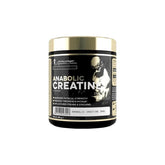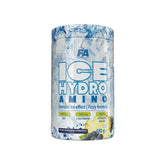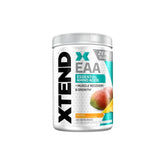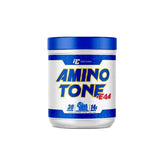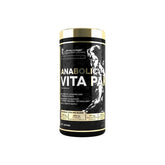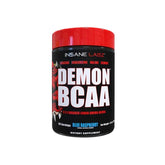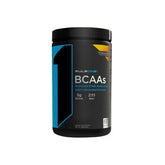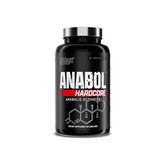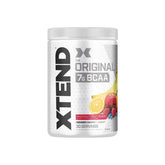Filter
19 results
20
- 10
- 15
- 20
- 25
- 30
- 50
Date, new to old
- Featured
- Best selling
- Alphabetically, A-Z
- Alphabetically, Z-A
- Price, low to high
- Price, high to low
- Date, old to new
- Date, new to old
Sort
Sort by:
- Featured
- Best selling
- Alphabetically, A-Z
- Alphabetically, Z-A
- Price, low to high
- Price, high to low
- Date, old to new
- Date, new to old
-
Kevin Levrone BCAA Defender – Boost Recovery & Performance Kevin Levrone BCAA Defender is a high-quality recovery supplement designed for athletes, bodybuilders, and fitness lovers. This powerful BCAA supplement helps reduce fatigue, boost muscle recovery, and support hydration. It delivers a strong 8:1:1 BCAA...
- Rs.7,000.00
Rs.8,500.00- Rs.7,000.00
- Unit price
- / per
Save Rs.1,500.00 -
FA ICE Hydro Amino 480g | Evercool Ice Effect | Fizzy Formula Experience a refreshing twist to your workout supplementation with FA ICE Hydro Amino 480g – Evercool Ice Effect | Fizzy Formula. This advanced amino acid blend is designed to support muscle recovery,...
- Rs.10,000.00
Rs.12,500.00- Rs.10,000.00
- Unit price
- / per
Save Rs.2,500.00 -
Scivation Xtend EAA | 40 Servings Scivation Xtend EAA 40 Servings is your ultimate muscle recovery fuel, designed to help you train harder, recover faster, and perform at your peak. With 7g of clinically studied Essential Amino Acids (EAAs), this advanced formula supports...
- Rs.9,500.00
Rs.11,000.00- Rs.9,500.00
- Unit price
- / per
Save Rs.1,500.00 -
Muscle Rulz Ashwagandha Root Extract Experience natural energy and stress relief with Muscle Rulz Ashwagandha Root Extract. Known for its ancient healing properties, this Best Ashwagandha Supplement supports mental clarity, physical endurance, and better recovery. Key Benefits of Muscle Rulz Ashwagandha Root Extract Reduces...
- Rs.6,500.00
Rs.7,500.00- Rs.6,500.00
- Unit price
- / per
Save Rs.1,000.00 -
Ronnie Coleman Amino Tone + EAA 30 Servings in Pakistan Ronnie Coleman Amino Tone + EAA is a cutting-edge amino acid supplement crafted under the esteemed Ronnie Coleman brand, tailored for individuals dedicated to optimizing their workout performance and ensuring swift recovery. This innovative...
- Rs.7,500.00
Rs.8,500.00- Rs.7,500.00
- Unit price
- / per
Save Rs.1,000.00 -
Kevin Levrone Anabolic Vita Pak 30 Sachets in Pakistan The Kevin Levrone Anabolic Vita Pak represents a comprehensive approach to nutritional supplementation, offering a carefully curated blend of vitamins, minerals, antioxidants, and amino acids designed to support overall health and well-being, particularly for active...
- Rs.11,500.00
Rs.13,000.00- Rs.11,500.00
- Unit price
- / per
Save Rs.1,500.00 -
Insane Labz Demon BCAA 60 Servings in Pakistan Insane Labz Demon BCAA is a high-quality intra-workout supplement designed to support muscle recovery, endurance, and muscle protein synthesis. This product features a potent blend of essential branched-chain amino acids (BCAAs), including leucine, isoleucine, and valine,...
- Rs.8,500.00
Rs.10,500.00- Rs.8,500.00
- Unit price
- / per
Save Rs.2,000.00 -
Kevin Levrone Anabolic Amino 300 Tablets in Pakistan Kevin Levrone Anabolic Amino is a dietary supplement designed to help support muscle growth, recovery, and endurance during intense workouts. It contains a powerful blend of amino acids, including essential amino acids, branched-chain amino acids (BCAAs),...
- Rs.7,500.00
Rs.9,000.00- Rs.7,500.00
- Unit price
- / per
Save Rs.1,500.00 -
Kevin Levrone Gold BCAA in Pakistan Original & Authentic Kevin Levrone Gold BCAA is available in Pakistan for you to achieve your fitness goal of Muscle Growth and recovery. We offer USA's best quality products, a Money-Back Guarantee, 24/7 Customer Support, Diet Plans, and free Fitness...
- Rs.7,500.00
Rs.9,500.00- Rs.7,500.00
- Unit price
- / per
Save Rs.2,000.00 -
Rule 1 R1 BCAAs 60 Servings in Pakistan Build Lean Muscle Mass and Grow Muscles with Rule R1 BCAA only in Pakistan from Fitzone.pk. 100% Original & Authentic Supplements at affordable prices. We offer USA's best quality products, a Money-Back Guarantee, 24/7 Customer Support,...
- Rs.9,500.00
Rs.11,000.00- Rs.9,500.00
- Unit price
- / per
Save Rs.1,500.00 -
Nutrex EAA+ Hydration Refuel Build in Pakistan Original & Authentic Nutrex EAA+ Hydration Refuel Build is available in Pakistan for you to achieve your fitness goal of increasing muscle protein synthesis. We offer USA's best quality products, a Money-Back Guarantee, 24/7 Customer Support, Diet...
- Rs.8,500.00
Rs.10,500.00- Rs.8,500.00
- Unit price
- / per
Save Rs.2,000.00 -
Rule 1 R1 Essential Amino 9 in Pakistan Original & Authentic Rule 1 R1 Essential Amino 9 is available in Pakistan for you to your fitness goal of maintaining and building new muscle mass. We offer US best quality products, a Money-Back Guarantee, 24/7 Customer Support, Diet Plans, and...
- Rs.8,500.00
Rs.10,000.00- Rs.8,500.00
- Unit price
- / per
Save Rs.1,500.00 -
Nutrex Anabol Hardcore 60 Capsules The nutrex anabol hardcore 60 capsules is a premium muscle-building supplement designed to support performance, endurance, and strength. Formulated with advanced plant extracts and bioactive compounds, it helps maximize workout intensity and supports lean muscle development. Whether you are...
- Rs.8,500.00
Rs.10,500.00- Rs.8,500.00
- Unit price
- / per
Save Rs.2,000.00 -
MuscleMeds Carnivor Beef Aminos 300 Tabs Product Overview MuscleMeds Carnivor Beef Aminos 300 Tabs is a premium amino acid supplement derived from 100% pure beef protein isolate. Designed to support muscle growth, recovery, and strength, it provides the anabolic benefits of beef in a...
- Rs.8,500.00
Rs.9,500.00- Rs.8,500.00
- Unit price
- / per
Save Rs.1,000.00 -
Rule 1 R1 BCAAs 30 Servings in Pakistan Build Lean Muscle Mass and Grow Muscles with Rule R1 BCAA only in Pakistan from Fitzone.pk. 100% Original & Authentic Supplements at affordable prices. We offer USA's best quality products, a Money-Back Guarantee, 24/7 Customer Support,...
- Rs.7,000.00
Rs.8,000.00- Rs.7,000.00
- Unit price
- / per
Save Rs.1,000.00 -
Scivation Xtend BCAA 90 Servings Scivation Xtend BCAA 90 Servings is one of the most trusted intra-workout and recovery supplements worldwide. Powered with the scientifically proven 2:1:1 ratio of branched-chain amino acids BCAAs, this formula is designed to maximize muscle recovery, improve endurance, and...
- Rs.17,500.00
Rs.19,500.00- Rs.17,500.00
- Unit price
- / per
Save Rs.2,000.00 -
Scivation Xtend BCAA 30 Servings Scivation Xtend BCAA 30 Servings is a premium intra-workout supplement designed to support your training goals. With an effective blend of branched-chain amino acids (BCAAs) in the optimal 2:1:1 ratio, it helps in promoting endurance, enhancing hydration, and assisting...
- Rs.7,900.00
Rs.9,500.00- Rs.7,900.00
- Unit price
- / per
Save Rs.1,600.00 -
MegaSports Amino Hardcore 325 Tablets in Pakistan MegaSports Amino Hardcore 325 Tablets is a carefully formulated amino acid supplement designed for individuals following a consistent fitness and wellness routine. It provides a wide spectrum of essential and non-essential amino acids sourced from high-quality protein...
- Rs.11,000.00
Rs.13,000.00- Rs.11,000.00
- Unit price
- / per
Save Rs.2,000.00 -
BPI Sports Best BCAA 30 Servings in Pakistan BPI Sports Best BCAA 30 Servings is a carefully formulated supplement for individuals maintaining an active lifestyle. It contains a blend of branched-chain amino acids (BCAAs) in the form of a unique peptide-linked chain. This unflavored...
- Rs.7,500.00
Rs.9,000.00- Rs.7,500.00
- Unit price
- / per
Save Rs.1,500.00



